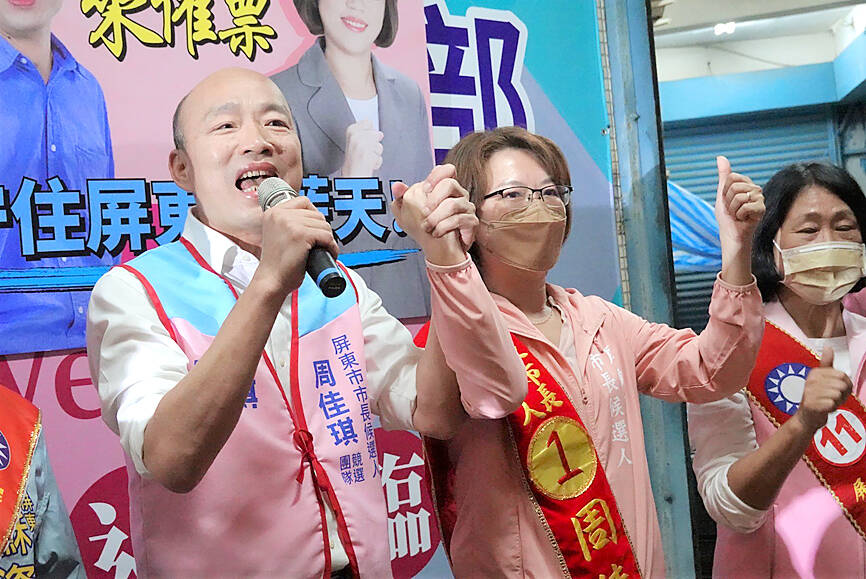Former Kaohsiung mayor Han Kuo-yu (韓國瑜) yesterday alleged that the Democratic Progressive Party (DPP) is using Taiwan Semiconductor Manufacturing Co (TSMC) as a means to secure votes for itself.
Han made the remarks in an interview on the Broadcasting Corp of China with network president Jaw Shaw-kang (趙少康).
Whenever the DPP faces the possibility of losing an election, it calls on TSMC to establish a plant in a county or city that is failing, Han said, adding that the chipmaker is like a “special branch” of the DPP similar to the Chinese Nationalist Party’s (KMT) relationship with the Huang Fu-hsing (黃復興) military veterans’ branch, whose members are considered party loyalists.

Photo: CNA
He also said that the DPP is “dismembering” TSMC.
Han said that young people are “waking up” and that the DPP is “treating the younger generation like fools.”
Future leaders are not blind to government corruption and the way county commissioners become billionaires at the end of their terms, he said.
Young people do not support authoritarianism and are not bound by tradition, Han said, citing the 72 Martyrs of Huanghuagang uprising in Guangzhou as an example of how young people are not afraid to risk fighting for change.
The 72 Martyrs launched the failed Second Guangzhou Uprising against the Qing Empire on April 27, 1911.
The DPP is aware of this change in attitude among young people, which is why the party has halted subsidies to help them travel back to their registered home town residences to vote, Han said.
The DPP is attempting to control the number of people who can vote by declaring that people who test positive for COVID-19 cannot enter polling stations.
Han said that military personnel — largely composed of young people carrying out mandatory service — are being affected by a DPP decision to rotate shifts on election day.
It is “preposterous” that military personnel cannot vote even when there is no threat of war, he added.
Jaw said during the interview that “voting for the DPP increases the risk of youth going into battle.”
Han responded by saying that those aged 18 to 24 are the primary casualties of war, and that peace must prevail.

Taiwan is to commence mass production of the Tien Kung (天弓, “Sky Bow”) III, IV and V missiles by the second quarter of this year if the legislature approves the government’s NT$1.25 trillion (US$39.78 billion) special defense budget, an official said yesterday. Commenting on condition of anonymity, a defense official with knowledge of the matter said that the advanced systems are expected to provide crucial capabilities against ballistic and cruise missiles for the proposed “T-Dome,” an advanced, multi-layered air defense network. The Tien Kung III is an air defense missile with a maximum interception altitude of 35km. The Tien Kung IV and V

The disruption of 941 flights in and out of Taiwan due to China’s large-scale military exercises was no accident, but rather the result of a “quasi-blockade” used to simulate creating the air and sea routes needed for an amphibious landing, a military expert said. The disruptions occurred on Tuesday and lasted about 10 hours as China conducted live-fire drills in the Taiwan Strait. The Civil Aviation Administration (CAA) said the exercises affected 857 international flights and 84 domestic flights, affecting more than 100,000 travelers. Su Tzu-yun (蘇紫雲), a research fellow at the government-sponsored Institute for National Defense and Security Research, said the air

Taiwan lacks effective and cost-efficient armaments to intercept rockets, making the planned “T-Dome” interception system necessary, two experts said on Tuesday. The concerns were raised after China’s military fired two waves of rockets during live-fire drills around Taiwan on Tuesday, part of two-day exercises code-named “Justice Mission 2025.” The first wave involved 17 rockets launched at 9am from Pingtan in China’s Fujian Province, according to Lieutenant General Hsieh Jih-sheng (謝日升) of the Office of the Deputy Chief of the General Staff for Intelligence at the Ministry of National Defense. Those rockets landed 70 nautical miles (129.6km) northeast of Keelung without flying over Taiwan,

A strong continental cold air mass is to bring pollutants to Taiwan from tomorrow, the Ministry of Environment said today, as it issued an “orange” air quality alert for most of the country. All of Taiwan except for Hualien and Taitung counties is to be under an “orange” air quality alert tomorrow, indicating air quality that is unhealthy for sensitive groups. In China, areas from Shandong to Shanghai have been enveloped in haze since Saturday, the ministry said in a news release. Yesterday, hourly concentrations of PM2.5 in these areas ranged from 65 to 160 micrograms per cubic meter (mg/m³), and pollutants were